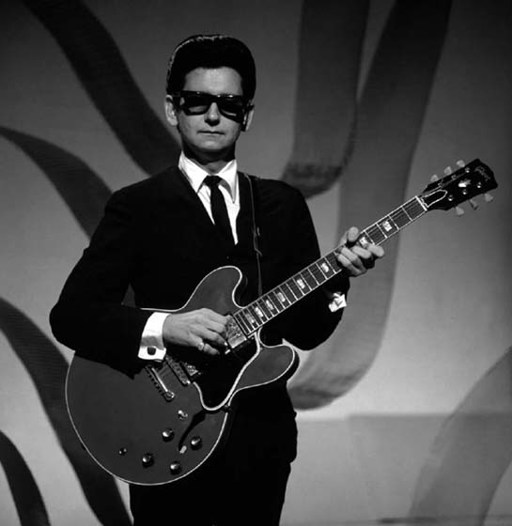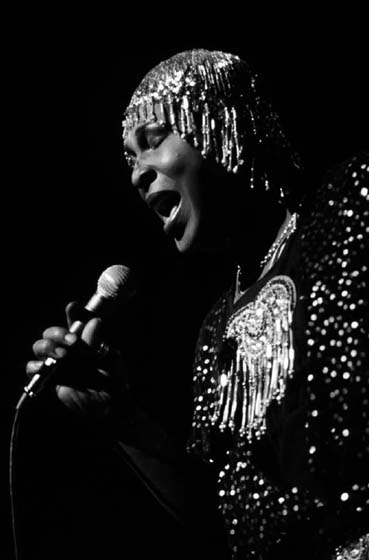The Encyclopedia of Dead Rock Stars (121 page)
Read The Encyclopedia of Dead Rock Stars Online
Authors: Jeremy Simmonds

With a new solo album,
Mystery Girl
(1989), ready for release, Roy Orbison took time out in December 1988 to visit his family in Nashville. While at his mother’s house with his surviving children, Orbison excused himself to go to the bathroom, but he did not return. When the singer’s son Wesley forced the door open, he discovered his father slumped on the floor. All attempts to revive him proved useless: ‘The Big O’ was dead at just fifty-two from a massive coronary. Posthumous tributes abounded, not least in the UK, where his greatest-hits package topped the album chart and a single, ‘You Got It’, put the singer in the Top Three for the first time in well over twenty years; meanwhile, a monument was erected and museum for the singer opened in Wink. Orbison was, however, interred at Westwood Memorial Park in Los Angeles – at the wishes of his second wife. His songs have been covered by many artists including Buddy Holly, Don McLean, Linda Ronstadt and even Van Halen.

Roy Orbison: It’s over
‘I once said to him, “Roy, you’re probably the greatest singer in the world.” And he said, “Probably.”‘
Tom Petty
See also
George Harrison ( November 2001)
November 2001)
Friday 16
Sylvester
(Sylvester James - Los Angeles, California, 6 September 1944)
(The Hot Band)
(The Cockettes)

Just a few months after Divine, disco’s previous ‘reigning queen’ also passed away: African-American Sylvester was perhaps the first on to the dance floor with sequins and glitter where previously we had only seen vest tops or collars. The singer was exposed to an eclectic range of music by his grandmother, former blues singer Julia Morgan, who had Sylvester listen to gospel and jazz as well as her own chosen field. Unfazed by his homosexuality though he was still being told it was wrong, Sylvester was a natural performer, moving to San Francisco in 1967 and setting up performance-art (ie, drag) troupe The Cockettes – well, it was never going to be anything else – and adopting the stage moniker Ruby Blue. Becoming familiar with his take on show numbers, many were surprised to learn that Sylvester also had considerable talent as a ballad singer; he landed a part in the musical
Hair
before, in 1973, forming The Hot Band, a funk/dance conglomerate that predated disco – at one point containing Izora Rhodes and Martha Wash, later hitmakers as The Weather Girls. Discovery by Fantasy Records A & R man Harvey Fuqua – who saw in the singer a star in the making – prompted Sylvester to strike out on his own, and a solo album was released in 1977. With the exception of his popular version of Ashford & Simpson’s ‘Over and Over’, the record was largely ignored, but its follow-up made Sylvester a big name. Boasting the sizzling Patrick Cowley-produced ‘You Make Me Feel (Mighty Real)’ (a UK Top Ten hit in 1978), the record was a flag-bearer for the openly gay disco scene that blossomed at the turn of the eighties. (Sylvester was a considerable influence on ex-Bron-ski Beat/Communards singer Jimi Somerville, who took ‘Mighty Real’ back into the charts in 1990.) After appearing in the Bette Midler movie
The Rose,
Sylvester’s appeal faded as the disco backlash kicked in. He did, however, team up once more with producer Cowley to create further high-energy gems – notably ‘Do You Wanna Funk?’ – on the album
All I Need
(1982).

Sylvester: Even God couldn’t save the queen
‘One of the few truly gay celebrities never to have renounced his gayness on the ladder to success.’
Armistead Maupin
Sadly, Cowley died within months of the record’s release ( November 1982),
November 1982),
one of the first showbiz victims of AIDS; in just three years, Sylvester himself had also been diagnosed with the condition, about which folk were still fairly ignorant. Refusing to denigrate his own sexuality, Sylvester continued to perform until shortly before his own passing; his final highprofile appearance was at the 1987 Gay Pride rally in San Francisco. He died from HIV complications a year later.
See also
Izora Rhodes-Armstead ( September 2004); Harvey Fuqua (
September 2004); Harvey Fuqua ( Golden Oldies #115)
Golden Oldies #115)
Wednesday 21
Paul Jeffreys
(England, 13 February 1952)
Cockney Rebel
BeBop Deluxe
(Chartreuse)

Bass guitarist with the original incarnation of Steve Harley’s Cockney Rebel, Paul Jeffreys played on a string of hit singles during the mid seventies, including ‘Judy Teen’, ‘Mr Soft’ (both 1974) and the 1975 chart-topper ‘(Come up and See Me) Make Me Smile’, as well as the albums
Human Menagerie
(1973),
The Psychomodo
(1974) and
Best Years of Our Lives
(1975). After the group’s 1977 split, Jeffreys joined occasional support act, the Bill Nelsonfronted neo-rock band BeBop Deluxe for live shows before forming his own group, Chartreuse, in 1979.
Just after 7 pm on 21 December 1988, Pan Am flight 103 began the second leg of its daily journey from Frankfurt to Detroit via London and New York. As the 747 flew over the small Scottish border town of Lockerbie, a device detonated in the forward cargo hold, causing the aircraft’s chassis to disintegrate rapidly. In the horror that followed, 243 passengers and 16 crew lost their lives, as well as 11 people on the ground. Among the passengers was Paul Jeffreys – now working for a record company – and his new bride, Rachel, with whom he was travelling to the US on honeymoon. After much effort, the trial of Abdelbaset Ali Mohmed al-Megrahi was secured; the former Libyan intelligence officer was found guilty of mass murder and sentenced to life imprisonment. At a one-off gig shortly after the disaster, Harley dedicated the song ‘Sebastian’ – perhaps Cockney Rebel’s finest moment – to the memory of his former colleague.